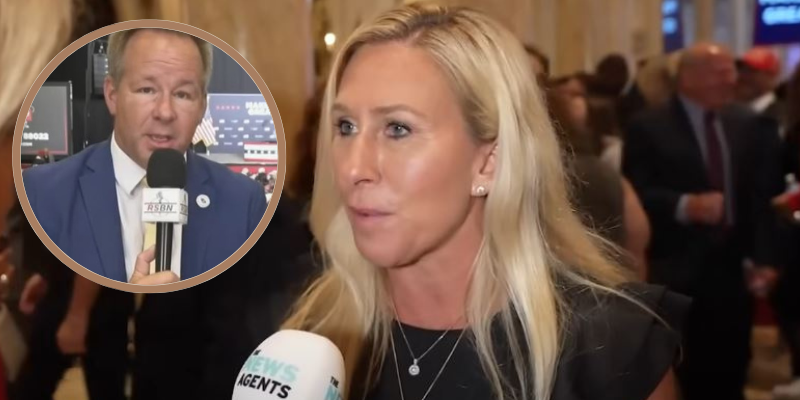Relationships frequently balance privacy and public spectacle in the volatile realm of American politics. This is also true of Georgia congresswoman Marjorie Taylor Greene, a firebrand who has made headlines with her extreme devotion to Donald Trump. Her relationship with conservative broadcaster Brian Glenn has been causing controversy lately, rather than her legislative record.
Their romance has been characterized by social media controversy and political tensions, resembling a tabloid-meets-newsroom drama. The most recent example of this glaringly personal divide on a national level was when Glenn openly opposed a House censure vote that Greene supported.
Marjorie Taylor Greene & Brian Glenn – Key Details
| Field | Information |
|---|---|
| Full Name | Marjorie Taylor Greene |
| Date of Birth | May 27, 1974 |
| Profession | U.S. Congresswoman (Georgia’s 14th District) |
| Boyfriend | Brian Glenn |
| Boyfriend’s Role | Chief White House Correspondent, Real America’s Voice |
| First Public Appearance | 2023, during Greene’s campaign rallies |
| Recent Controversy | Disagreement over Rep. Al Green’s censure vote |
| Public Incident | Glenn’s old drag video resurfaces, Greene defends him |
Public vs. Private: When Intimacy and Ideology Collide
An experienced media personality with a penchant for controversy, Brian Glenn, disagreed with Greene’s choice to reprimand Rep. Al Green for interfering with former President Trump’s State of the Union address. Greene voted with her Republican colleagues in support of the resolution, but Glenn, in a remarkably open Newsmax interview, questioned whether the act actually deserved official censure.
He didn’t make a subtle objection. According to him, such measures ought to be “reserved for much harsher penalties” rather than being employed as hasty responses to political opposition. Glenn’s position was especially unexpected for a man who is so strongly associated with the far-right media landscape.
Drag, Opposition, and Disobedience: Brian Glenn in the Public Eye
As if their political disagreements weren’t enough, a video of Glenn in drag that purportedly came from a humorous segment of his time as a local news anchor reappeared online. Critics jumped in, citing Greene’s public opposition to drag shows.
Greene leaned in instead of pulling away. She defended Glenn’s throwback with the same vehemence she usually saves for criticizing the liberal media, tweeting, “I’m literally lol’ing.” Despite being predictably combative, her response struck a tone of loyalty, possibly indicating that even the most intense public scrutiny can not break personal bonds.
An Impossible Love Story in the Hyperpartisan Age
In many respects, Glenn and Greene exemplify the contemporary political couple: they are media-savvy, ideologically motivated, and always juggling the hazy boundaries between their personal and professional lives. Their relationship is a reflection of the wider political polarization, where party lines and televised arguments can put even romantic relationships to the test.
They have created a narrative that is unusual but remarkably resilient by standing by one another in the face of criticism. The story is one of perseverance in the crucible of American politics, not one of scandal.
A Tension Reflecting a Greater Reality
It might appear that their argument over Rep. Al Green’s censure was an isolated incident. But it reveals something more profound. In a time when political affiliation is frequently equated with loyalty, Glenn’s opposing perspective served as a reminder that independent thought can still flourish, even in power dynamics.
Surprisingly, his position gave a conversation that all too frequently devolves into partisan tirades more depth. It questioned the idea that romantic or business relationships have to always go according to the same pattern.
Implications for Political Conversation
People like Greene and Glenn will continue to push the boundaries of public tolerance and individual freedom in the years to come as political narratives become more performative. Even though their union is unconventional, it is unquestionably appealing.
If anything, the couple’s dynamic provides a model—albeit a divisive one—for how public personalities could resolve personal conflicts without collapsing under public pressure.
They’ve produced a political spectacle that combines elements of a soap opera and a civics lesson by embracing transparency, even when it’s messy.
Though it is also personal, the personal is political
In contemporary politics, the romance between Marjorie Taylor Greene and Brian Glenn has transcended from the censure floor to Twitter feeds. It serves as an example of how power, personality, and the media interact and how human ties persist despite differences in opinion.
Their relationship, characterized by public arguments and private allegiance, serves as a reminder that complexity still exists in a world where politics is frequently reduced to soundbites. And maybe, somewhat unexpectedly, that’s something to support.



